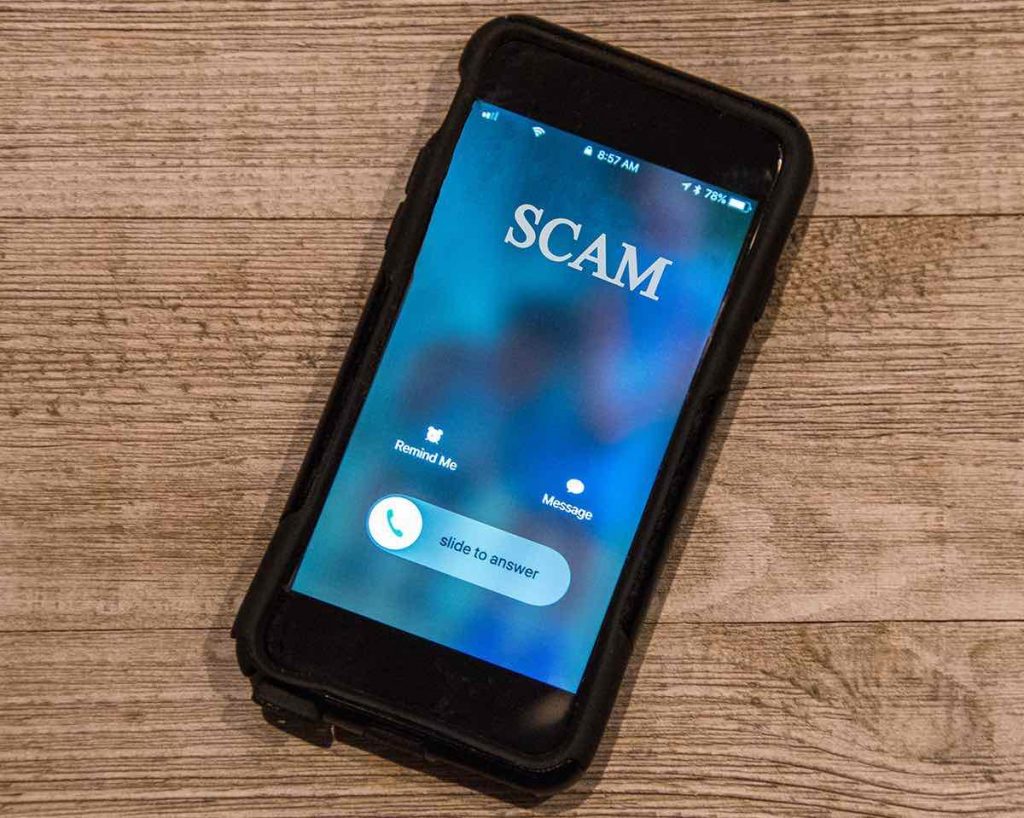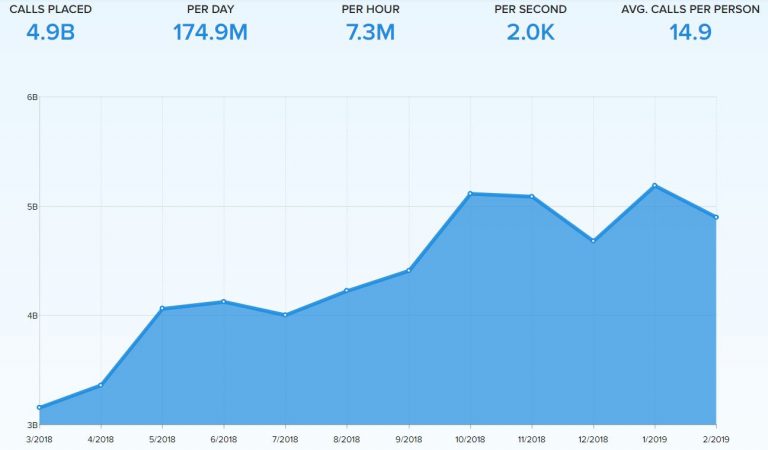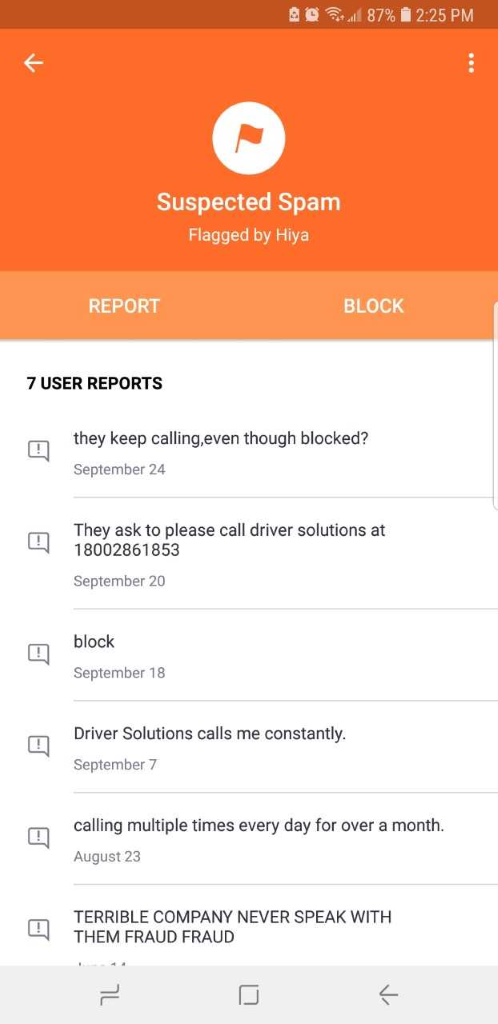
5 Ways to Help Protect Your Time and Money from Robocalling Scammers
by Tull Financial Group | March 5, 2019 | Security
If a year has 525,600 minutes, and there are 967 robocalls being placed per second, what does that equal in terms of potential lost productivity? The basic math of the equation is 30.5 billion scam calls are expected throughout next year alone. If one chooses to answer any of these calls, or even just pauses to check the number of the caller, then even a fraction of those 30.5 billion spam calls can make a huge dent in productivity in both personal and professional realms. The Federal Trade Commission (FTC) has a record of receiving over 7 million complaints in 2017 pertaining to the sheer increase of volume in these spam calls consumers are receiving. If that doesn’t scream unproductive, I’m not sure what does.
According to this graph from RoboCallIndex.com, here is what the past year (from March 2018 – February 2019 at a national scale) has looked like as far as robocalls are concerned:
At Robocall Index’s website you can see the numbers in each specific area code, and it also breaks down the types of calls (telemarketing / scams / payment reminders / alerts and reminders). If these numbers are upsetting to you, then you’re not alone.
Phones are getting smarter, and unfortunately, phone scammers are too, with half of all cell phone calls projected to be scams by 2019. Even with putting precautions in place, TFG still receives its fair share of spoofed and fake phone calls in a day. I always feel like somebody is calling me!
Is the IRS Really Calling Me?
What’s even more frustrating is that scammers are usually trying to con their targets on a financial level, which affects us and our clients directly. On a personal level, I have firsthand experience with the same frustrations I imagine everyone else is sharing right now.
A few years ago, I received a call from my local sheriff’s department stating that there was a warrant out for my arrest and that I needed to call the IRS at a direct number immediately. After a brief moment of panic, I decided to investigate by calling the non-emergency police line to see if there was any truth to the message. They then directed me to the sheriff’s department which said there was no outgoing call to me, and that they did not have a warrant for my arrest on any account. Cue happy dance! Once that was over, I thought, “Why did this even scare me?” I should have known it was a scam. Here were the telltale “red flags”:
- It was a call that went directly to my voicemail without ringing, it simply said it was a missed call
- Both the police and sheriff were unaware of such calls going out on their end
- The IRS usually does not communicate with tax-payers through phone calls; if they request payments it will likely be via mail
I have since spoken to several people who have received similar calls to the IRS Phone Scam, and now scammers are adding even more “official” sounding calls to their list. Sometimes it’s a fake bulletin from the Veterans’ Affairs General, or worse, it’s the Social Security Scam, which the Social Security Administration (SSA) takes very seriously.
According to the article, the fraudulent callers state, “due to improper or illegal activity with a citizen’s Social Security number (SSN) or account, a citizen will be arrested or face other legal action if they fail to call a provided phone number to address the issue. This is a scam; citizens should not engage with these calls or provide any personal information. SSA employees do contact citizens, generally those who have ongoing business with SSA, by telephone for customer-service purposes. However, SSA employees will never threaten you for information; they will not state that you face potential arrest or other legal action if you fail to provide information. In those cases, the call is fraudulent, and you should just hang up.”
These types of impersonation scam calls are numerous and there are no signs of them stopping just yet.
Hello? Is Anyone There? Helloooo?
Do you receive calls from what appears to be your neighbor, but it turns out it is no one at all? Some of the daily calls we receive at TFG are robocalls with no one on the other end of the line – the robocall is just testing to see if someone answers, and will register our number as “active.” Another nuisance are calls coming from “local” numbers that start with the same area code and 3-digit prefix as ours. So, what do you do when you get half a dozen calls a day from a number that looks like it could belong to someone you know?
This past October, thirty-five State Attorney Generals agreed to strongly urge the FCC to fight even harder against these calls, to buy everyone a little more peace of mind (and quiet time at dinner without a phone going off somewhere.) Even some bigger tech giants are taking matters into their own hands, such as Apple filing a patent for spoof detection.
How Do I Make It Stop?
I got errors from jetpack that https://strelitzinternationalacademy.org/ is appears to be offline or unresponsive
Could you please tell me reason for same?
Regards and Thank you!
It’s great that the powers-that-be are trying to do something about these annoying and potentially dangerous calls, but action is still in the early stages. Until significant achievements are made, here are some steps that we suggest following to help make your phone a little quieter, and to hopefully make your funds a little safer from crooks:
1. The FTC’s National Do Not Call Registry: If you haven’t added your phone number(s) yet, go ahead and do that now. You can also verify if and when your phone number was added to the registry list. You used to have to re-do this every few years, but now your registration does not expire.
2. Google It!: When it comes to scam phone calls that go straight to your voicemail, Google search is a valuable cross-referencing tool for phone numbers. For example, when we call our clients and leave a voicemail, we will include our phone number (757-436-1122) and/or our toll-free number (888-296-7526). If you were to doubt the validity of our message, you could search either of those numbers and it would bring up our company – a solid match. A step further would be to visit TFG’s “Our Team” page to match the name with the message – we always mention who, exactly, is calling!
3. Third-Party Apps*: There are plenty of free and for-purchase third-party apps and websites helping fight against these scam callers. For example, for personal purposes I use the free third-party app called Hiya on my cell phone. I have found that it does a pretty good job of figuring out which calls are spam, and as you can see from the screenshot below, it allows you to report calls as specific types of spam, i.e. “Telemarketer/IRS Scam/General/etc.”
An internet search for “robocall blocking apps” will result in several choices and reviews, allowing you to choose which service may be right for you. (TFG does not endorse or recommend any specific service or company.)
4. Report the Calls When Necessary and Applicable: The IRS has made a short video dedicated to “their scam” and suggest reporting calls here. The National Do Not Call Registry also has an option for you to list numbers which have contacted you.
5. Ignore It: When in doubt, simply do not answer the numbers you do not recognize. A good rule of thumb that I apply to my personal phones is, if I do not recognize the number, then I do not answer it. If it is a legitimate call, the caller will leave a relevant voicemail and I will know it wasn’t trying to register my number in a spam cycle.
There’s no denying it is a rampant, frustrating, and ongoing problem, not just at the business level, but at the personal level too. Through application of the Do Not Call Registry, scam-blocking third-party applications, and exercising utilization of search engines for unknown numbers, you’re another step closer to keeping yourself from becoming a victim of these traps set to empty your wallet. One bit of good news is that these scam calls are often illegal, and when they’re caught, it can result in significant jail time, like the 20 years received by this India-based IRS phone scam operation for fraud and money laundering.
Staying alert and aware of what is going on should make handling scam calls a little bit easier – sometimes as easy as hitting a “block” button on your cell phone because you weren’t expecting a call from Egypt. It could be your neighbor, it could be legitimate, or it could be just an empty call testing the line. Are you going to answer it?
Tull Financial Group is a fee-only advisory firm and a proud member of NAPFA (National Association of Personal Financial Advisors). The team at TFG is committed to providing the best wealth management and retirement planning services by creating and maintaining relationships that go beyond your bank account so that we can help you achieve your financial goals.
*This information is for illustrative and informative purposes only. Tull Financial Group does not endorse or recommend any specific service or company. Clicking on any links contained in this blog may lead you away from TFG’s website. These web sites are not affiliated with nor monitored by Tull Financial Group, Inc. Third party websites linked to TFG’s site are for informational purposes only, and are not to be construed as endorsements, tax, legal, or investment advice.
This blog article is provided for general information only, and nothing contained in the material constitutes a recommendation for purchase or sale of any security, or investment advisory services. Reproduction of this material is prohibited, and all rights are reserved. Read the full Disclosure.


